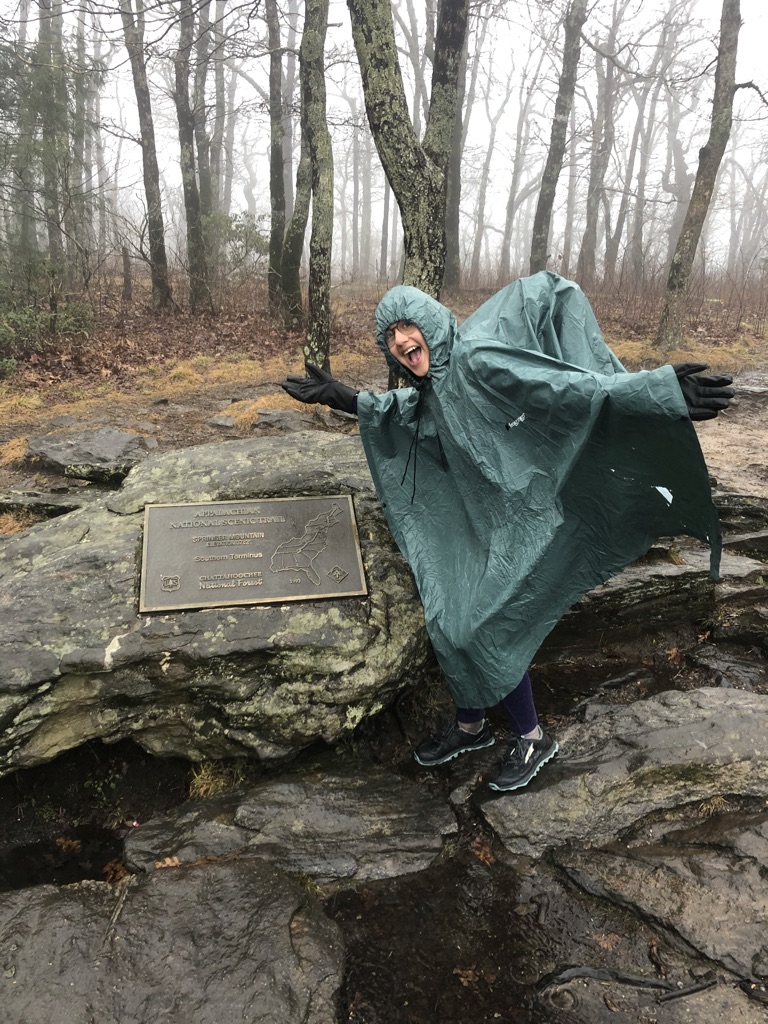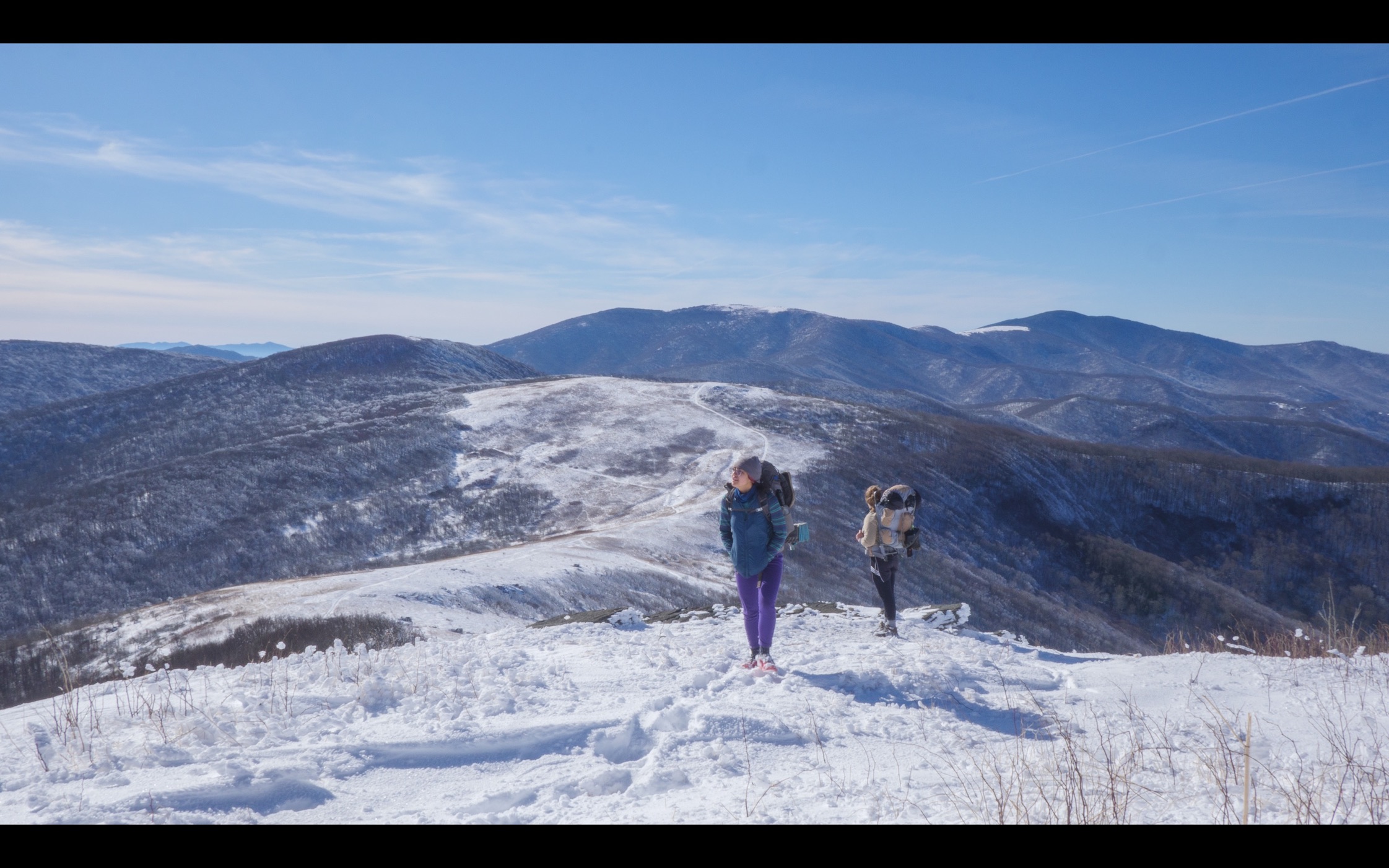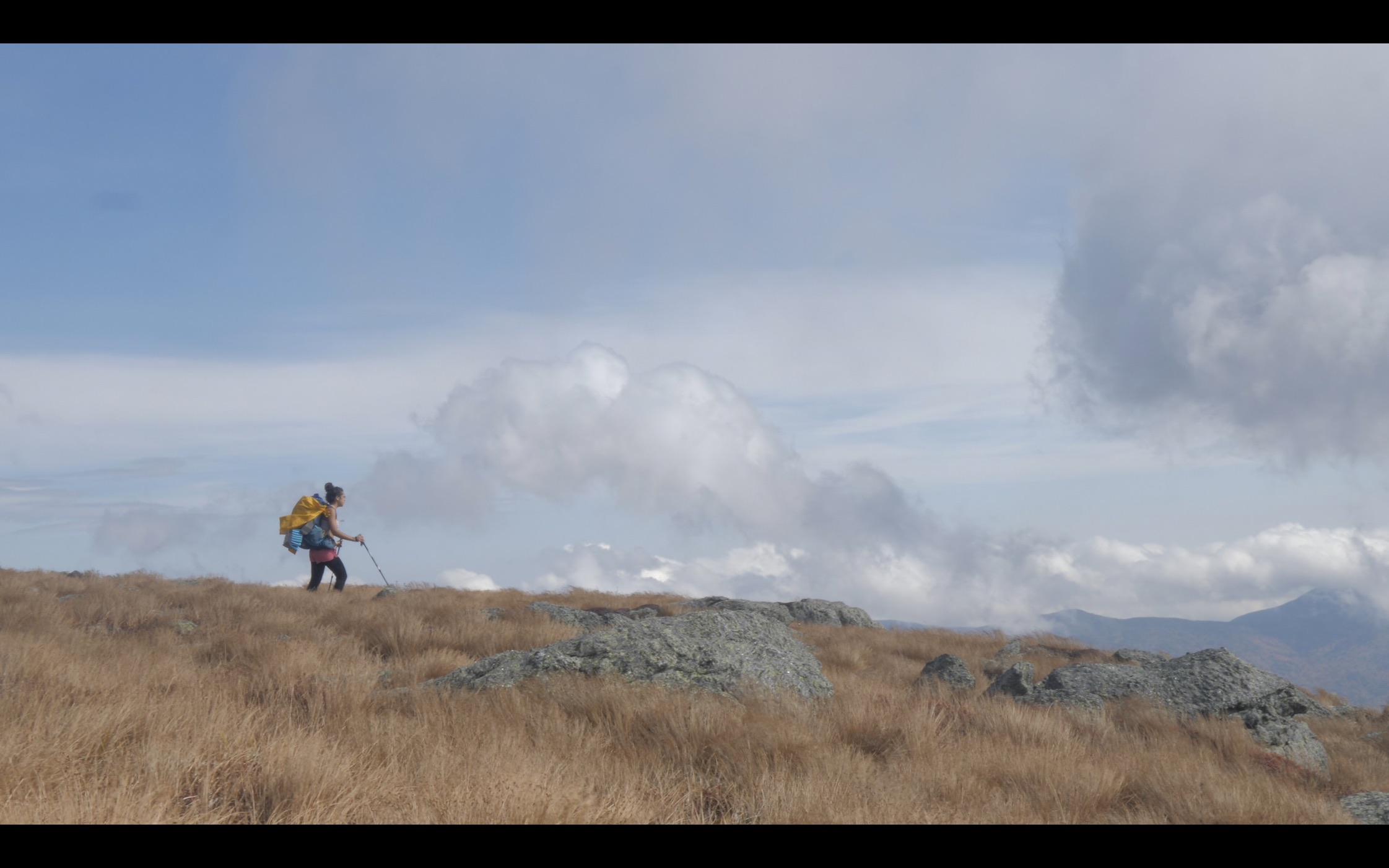New AT Documentary Is a Moving Portrait of Trail Life with an Eating Disorder
“You don’t climb mountains without food in your belly,” says Aster Wells-Byers in the film, “Food in your Belly.” The 15-minute documentary, directed by Lukas Chin and edited by Chin and Gabriella Medrano, explores Wells-Byer’s eating disorder as she hikes on the Appalachian Trail through the late summer, fall, and winter.
It is an inspiring portrait of strength, resilience, and hope. On a long-distance hike, you can’t hide from yourself. Under Chin’s direction, Wells-Byers doesn’t hide from the audience either, as we watch intimate moments of vulnerability as she grapples with her conflicting desires to restrict and to recover.
Wells-Byers and Chin began the AT SOBO on August 26th, 2020 at Katahdin. They hiked until Delaware Water Gap, then flipped to Springer Mountain and hiked NOBO until the Grayson Highlands. They completed 1400 miles, or about two-thirds of the AT, finishing on February 1st, 2021.
Q&A with the Team Behind “Food in Your Belly”
I interviewed Wells-Byers, Chin, and Medrano on October 27th, 2022. Wells-Byers is currently home in Madison, Wisconsin. Chin recently completed the PCT, and Medrano, who is not a thru-hiker, is working as a photographer.
Interview has been edited for length and clarity.
How did the three of you connect?
Lukas: Aster and I met two weeks before we did the hike. It was pandemic summer. We did this canoe camp, this very small camp that Aster and I are connected with. Four of us from the camp didn’t know what we were doing that fall. Someone there at the camp said, “oh, you should hike the Appalachian Trail.” Then 10 days later, we were there.
Gabi is also my connection. By midway through the hike, we knew that this is a tremendous story and it was going to be a film. Gabi and I went to film school, she’s a friend from the same program. Gabi joined early in post-production when we were editing.
I’d love to hear about that moment when you decided to make this film.
Aster: The film started as something else. It was originally the story of me being on trail and being brown, and it being election season. And then, during the interviews with the camera, Lukas realized maybe that wasn’t why I was hiking, it was a little bit more the eating disorder. So we kind of accidentally found ourselves focusing more on the eating disorder and how trail affected that and helped that.
Lukas: We were hiking with a group, and Aster was sharing so much, and she was being so open and vulnerable to everyone. You could just see that Aster’s going through something amazing right now. And I just went to film school, and I have this camera like, “Why don’t we share this story?” It wasn’t even that much work making it, we were just interviewing each other. And the setting was so pretty. It kind of just fell into place.
You said you started this as a project about being a person of color on trail. Would you mind talking a little bit more about that?
Aster: Right before this camp that I met Lukas at, I was part of an organization called Black Umbrella here in Madison, Wisconsin. We organized protests. Then I decided I was going to hike the trail. I let my crew know, and they were all really bummed. So I got onto trail, and I felt really bad because it felt like I was walking away from the movement. Then I found my footing, and I was like, “No, this is my own movement.” I have a place and a voice that has to be heard out here too. And it is a huge privilege. But it’s not as easy.
Lukas: Thru-hiking content is mostly white hikers. So even just having a Mexican-American woman hiking the Appalachian Trail, it’s a big thing. We didn’t even talk about it in the film.
Aster, you talked in the film about “hiking for hiker hunger.” Can you expand on that a little bit?
Aster: When I started reading about the trail and what to expect, everyone talks about hiker hunger. About a month in, your metabolism realizes you’re moving so much, and we have to keep fueling ourselves more than we would in our daily life because we’re burning so much. That was really scary to read about because I have a restrictive eating disorder, which makes me feel like eating isn’t cool. But I was hoping that hiker hunger would help me find joy and maybe comfort in being hungry and wanting to eat. Not just eating because I need to, and I need to keep going. But also really wanting to eat.
I was initially like, “No way, my eating disorder is gonna be way louder than hiker hunger.” Then I found myself there, and I was like, “Oh my gosh, I want to eat.”
What do you think was the best meal you had on trail?
Aster: I think my favorite meal was in New Hampshire. We went into town and we both got a full pizza and poutine.
Lukas: I think that was the moment where we were like, “oh, we have hiker hunger.”
Aster: I think we also had a burger. Oh my gosh, that pizza was so good.
Lukas: We had pizza and burgers and poutine.
Gabi and Lukas, I’d love to hear a little bit about the process of directing, filming, and editing this piece.
Lukas: I had a camera, a tripod sometimes, and I had a lavalier mic. My main goal was to not have shaky footage.
Gabi: When we went to edit the film, to me, it didn’t matter which thing Aster did first—I wanted to follow the emotions of what I felt like she was going through. I wanted to create the energy of the trail, and chronological order doesn’t necessarily do that. The film really comes back to one interview that was a little bit deeper in the hike. It felt like a place to start, even though it wasn’t the start of her experience. It seemed like that one interview was the root of everything that had been going on the whole hike.
Aster: Lukas caught this super tender moment in that particular interview. It was really great and really scary to watch on a big screen. It’s really magic to pull all these pieces, and they all fit this one interview that we had. You did a good job there, Gabi.
Speaking of the difficulty, not only do you hike the AT SOBO, but you also hiked into the winter. I’d love to hear about your hiking backgrounds and how you coped with the normal challenges of the thru hike.
Lukas: I think I had backpacked twice before starting the AT. We started August 26th, and everyone’s like, “oh, we’ll finish this up by Christmas.” We found out very quickly that we would not finish by Christmas. Once we got to Pennsylvania, it was Thanksgiving. It was so cold. We were like, “oh, let’s take a bus down to Springer Mountain, and then it’ll be warm. It’s Georgia. Georgia is warm in December.” No, it was not. The first day in Georgia, it was raining really, really hard. We woke up and everything was frozen, like our pants were solid ice. It was just so cold the last three months till February 1. We were doing bad.
Aster: I’d never backpacked. I hated hiking. When I said I was going to hike the trail, my mom was like, “You’re not gonna like that.” I kind of just followed what everyone else was doing. Being thrown into Maine in the wilderness, being beaten into shape, while also fighting with this voice in my brain, in my stomach and my hunger cues and everything, was overwhelming.
What was so beautiful, at the same time, was that I didn’t want to walk away from it. Hiking in the snow is hard. And then you walk away from it, and you’re like, “oh my gosh, everyone should only hike in the winter because it makes you feel so strong and so awesome.”
Gabi, I’d love to hear about your impressions of the AT and the hiking community as someone who spent a lot of time with footage and talking to hikers, but who hadn’t been in the thick of it.
Gabi: I had zero knowledge of anything hiking related. My folks do not go hiking. I come from that stereotypical Latino family where we just assumed that that’s not for us. And so seeing it, parts of it are easier than I thought it would be, and more accessible. Parts still look very hard, but not impossible, the way it used to be in my brain. For multitudes of reasons, brown people are less inclined to do a thru hike. The impression I got from the film in the footage was that still a lot of people will receive you well. The people in the film seemed very open. It seemed far more accessible that I was under the impression of it being.
Aster, I’d love to hear about people’s reactions to you deciding to hike the AT in the context of being in recovery from a restrictive eating disorder.
Aster: In those two weeks before getting on trail, I lost weight because I wanted to look good on trail. Then my mom noticed, and she’s like, “Oh, this isn’t a good idea. You can’t do this, you’re gonna kill yourself.” And I was thinking, “at least I’ll go out somewhere beautiful.”
I really wanted to get on trail so that I could restrict myself more, and be away from my mom. Then, the first day on trail, there was this group of friends that were eating spoonfuls of peanut butter from this giant peanut butter jar and this gallon-size bag of trail mix. I was like, “oh, fuck, this is what I’m getting myself into.” People were worried and skeptical that I could do it.
I also have chronic Lyme disease, and so most of the pushback I was getting was like, “Aster, your body can’t do that.”
What was people’s reaction when you did make it?
Aster: My mom is really, really good at working with me and my eating disorder. She was really worried about me leaving and going and dealing with it on my own. I would send her pictures of food while I was on the trail, and she was always crying, telling me how happy she was and how proud of me she was. When I came home, I didn’t need this film to feel like a movie star because my mom was telling everybody. She was really proud of me.
You mentioned that you had taken a step back in recovery right before hitting trail, and at the beginning of trail, but trail ended up helping you rediscover the joy of eating. When was that shift for you?
Aster: Somewhere near the end of our hike, I felt that this was gonna stick. When we finished the hike, we went back to New York where Lukas lives, and I would pick up a journal I had made while in recovery, I’d be like, “Wow, I just did this beautiful full circle.” A year from leaving the eating disorder hospital, I did this awesome hike. Next year, I’m going to do something even better. I’m going to beat my fear of weight. I don’t think there was a moment, though. It’s kind of just all of the moments. And then when it came to a close, it’s like, “OK, let’s stick with this.”
Could you talk about getting off trail and your process of recovery in the two years since your final words of the film?
Aster: Right when I got off trail, I decided I was gonna do the Arizona Trail. I got on the Arizona Trail to test my water intake. To this day, food isn’t that much of a struggle anymore. I don’t listen to that voice. But I really struggle with water. It almost feels worse than food. I quickly realized on the Arizona Trail, maybe it’s not smart to test your eating disorder out there alone. Especially in the summer in Arizona, that was a little bit too much of a risk. So I got off just because I wasn’t being smart with it, and I didn’t want to die out there, even though it was really pretty. I was in a totally different mindset than when I walked onto the Appalachian Trail. This time I really, really wanted to get better. I didn’t want to die.
Then I got off trail and I managed a hostel in Santa Fe, and that was amazing. It helped me establish a bit of a better relationship with food too. We had this big communal kitchen, and we had all these people from everywhere cooking. There was always a delicious meal and such a sense of community. So that really helped.
I came back home just over a year ago and moved in with my mom, and I took a dive. I wasn’t taking care of myself. Winter in Wisconsin just really sucks. I started really restricting again for the first time in quite a while. Then in December, there was a big major family shift. And I was like, “OK, I need to take care of myself because there are lots of people that care about me.” So since December 2021, I’ve been pretty good. Now I live on my own. I’m the only person that sees me every day. I have to hold myself accountable. It was really scary at first, but now it feels so good and empowering. I don’t need anyone else to hold me accountable anymore.
Lukas and Gabi, I’d love to hear about if you have if either or both of you have any other films in the works that you’re excited about. Or any other film ideas that you want to do at some point.
Lukas: I just shot a whole bunch on the PCT, so I’ve been editing that. Not sure what form it will be. It’s kind of long, so it might be a series, and it’s very different than Aster’s film. It’s more small moments on the trail, dipping into different people’s hiking lives and experiences.
Gabi: At the moment, I don’t really have anything. Me and Lukas toy around the idea of a film about gender and sports. A school I coach at has a lot of trans and nonbinary kids that love sports. So then, where do they play? And how do you decide that when things are so gendered? But that’s just an idea, it’s not anything yet.
What are your hopes for this film?
Aster: Lukas had mentioned the Banff Film Festival. That was one that he really wanted to get it into. I have family out there, and I have people there from the community that Lukas and I met through. So Banff is where I’d like to see it.
Lukas: I think Aster’s story is really inspiring. I hope it can be shared online and that it can help some people that are also going through any sort of struggle. Maybe it’ll inspire a thru-hike.
Gabi: Yeah, I agree. I got to go see a screening of it in Brooklyn and saw people’s reactions to three things: to Aster’s story, to Aster as an individual, and then to the trail. People resonated so hard with Aster. It’s a really beautiful thing to see a complete stranger now feel connected to Aster in some way because of the film. I have some similar identities to Aster, and when I was watching and editing the film, I felt that I could maybe also hike and do something like that. My brain before was like, “people like you don’t go hiking, they don’t do that thing.” That seems less true now.
I’d love to hear any advice that you guys may have for people watching the film who are struggling, whether that’s with an eating disorder, or in some other way.
Aster: What really helped me was talking back to my eating disorder. Differentiating my eating disorder from myself was really, really big and really important to the start of my recovery. Talk back to your eating disorder. Yell at it, scream at it.
Gabi: Just general health advice and mental health advice: just being outside in nature seems incredibly powerful. I think connecting to nature can be really healing.
Lukas: For me, as someone that’s part of a support system, I think what helped me was educating myself and doing the research. There’s major research on most mental health issues, and it’s important to educate yourself, to learn how to be a net and a support system and an ally.
Watch “Food in Your Belly” here. Follow Aster Wells-Byers on Instagram here. Follow Lukas Chin here. Follow Gabriella Medrano here. Interested in other stories of hikers with eating disorders? Check some out here, here, and here.
If you or someone you love suffers from an eating disorder, call the National Eating Disorders Association helpline at (800) 931-2237 or text (800) 931-2237.
All images courtesy of Lukas Chin.
This website contains affiliate links, which means The Trek may receive a percentage of any product or service you purchase using the links in the articles or advertisements. The buyer pays the same price as they would otherwise, and your purchase helps to support The Trek's ongoing goal to serve you quality backpacking advice and information. Thanks for your support!
To learn more, please visit the About This Site page.

 ">
">








Comments 1
Thanks for the heads up on this excellent video. Sure I will be watching many times.
Hot Damn, thank YOU.